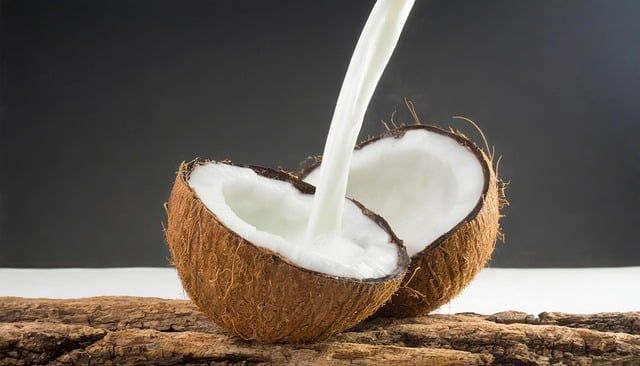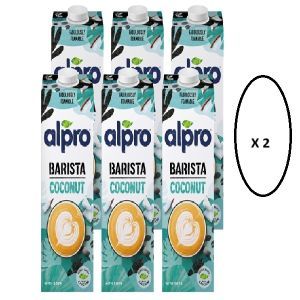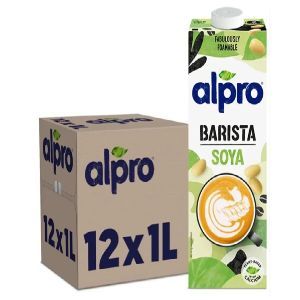Coconut Milk vs. Dairy Milk: Which is Better for Different Diets?

Milk has been consumed all over the world for many centuries. Today, however, consumers have more choices than before to make when they are being served by a given organization. As people become more aware of the plant-based diets and other health benefits of Alpro coconut milk it has become a dairy milk substitute. But when it comes to the nutritional value, suitability of diets, taste, etc they are actually different, right? This blog will try to give you more information about coconut milk vs dairy milk in an effort to help you see which one of them is better for your diet.
Complete Nutritional Value of Coconut & Dairy Milks
Calories and Macronutrients
Dairy Milk: Dairy milk is a good source of protein which has approximately 8 grams of protein in a cup. It also has the provision of daily requirements of calcium, vitamin D, potassium, and vitamin B12. Whole milk contains more calories than fat and has about 150 calories per cup while that of skim milk is about 80-90 calories per cup.
Coconut Milk: Coconut milk has a lesser amount of protein than cow milk which is approximately 0.5grams per 1 cup but higher amounts of fat specifically saturated fat. It tends to have between 50-60 calories for the cartons that are used in drinks, whereas the canned coconut milk has more or less 450 calories per heat quantity due to the presence of fat. However, coconut milk contains minimal levels of healthy nutrients such as manganese, iron, magnesium, and phosphorus.
Overall Vitamins and Minerals
Milk from the producing animals is an excellent source of calcium and vitamin D naturally present and these are important for our bones. Unfortunately, many of the coconut milk brands sold contain added calcium and vitamin D along with sometimes vitamin B12; however, their bioavailability cannot be compared to fresh coconut milk.
How Different Milk Type Meets Different Dietary Requirements
Vegan and Plant-Based Diets
Coconut Milk: Coconut milk is preferred by most people who are on vegan or plant-based diets since its entirely plant-based. It is recommended for those who want to maintain a no-animal product diet but love the texture that arises from milk products.
Dairy Milk: Dairy milk hence comes from animals and thus can not be taken by anybody on a vegan diet. People on a vegetarian diet can still take dairy milk, but for vegans and people who are avoiding animal products in their diets, there is plant milk.
For Weight Loss and Consuming Less Calories
Coconut Milk: Coconut milk in small lightweight cartons usually located in the refrigerator section is quite lean containing approximately 45-60 calories per cup and can be part of the slimming plan. Nonetheless, canned coconut milk contains a lot of fat and therefore calories making it unfit for those who wish to reduce their caloric intake.
Dairy Milk: Skim and low-fat dairy milk is considered for weight loss due to low calorie and fat intake, of about 80-100 calories per cup. Another benefit of the protein found in dairy milk is the ability to helping in controlling hunger hence managing overeating.
To Stay on Low-Carb Diets
Coconut Milk: As you know, coconut milk is quite high in some fats and very low in carbohydrates, which makes it perfect for the keto and low-carb diets. Actually, most of the fat in coconut milk consists of MCTs, which are believed to make you more energetic and help your body use fat more effectively.
Dairy Milk: Regular cow milk also contains naturally occurring sugars in the form of lactose; a cup of milk has 12gm of carbs hence not the best for low-carb or ketogenic diets. While using low-carb diets some people may decide to use a small amount of heavy cream because it is a low-carb dairy product than milk.
For Meeting Paleo Diet
The only restriction in the Paleo diet excludes processed foods, grains, and legumes with a lot of concentration on the natural food compartment.
Coconut Milk: Organized in the Paleo diet is coconut milk free from dairy products and as much as possible from any processed food therefore, it is approved. While it has fat content, it falls accordingly with the Paleo diet making it a favorite for Paleo eaters.
Dairy Milk: Because the Paleo diet does not allow any dairy products, those made from dairy milk are not allowed on the Paleo diet. Coconut milk, almond milk, and cashew milk would become new sources that paleo dieters would have to seek.
For Those Who Are Lactose-Intolerant
Coconut Milk: It lacks lactose, which is a common problem among people with lactose sensitivity or any other dairy product allergy. It is close to a cream but doesn’t cause a digestive problem common in consumption of products made from animal milk.
Dairy Milk: This is because for those people who cannot take lactose, normal dairy milk causes some uneasiness in their digestive system. There are great dairies without lactose as well, but some individuals may indeed wish to stay clear of dairy products.
For Meeting High-Protein Diets
Dairy Milk: To add on this, dairy milk is loaded with protein; this glass provides 8 grams of protein, and so is good for those on high protein diets. Incorporating dairy milk would be useful for physically active people and for everyone willing to increase their protein intake as protein is needed for muscle rebuilding and maintenance.
Coconut Milk: Coconut milk is not a rich source of proteins either, with about half a gram of protein per cup. High-protein diet consumers would better combine coconut milk with other protein-containing products or additives.
Difference in Texture & Taste
Dairy Milk: Dairy milk is rich, fine textured, and has a pleasantly bland taste suitable for both, sweet and savory food preparations. They don’t impart any flavors, thus one can use them for drinking, cooking, and even baking purposes.
Coconut Milk: Coconut milk is characterized by its exotic taste that may bring a special zest to a dish. It is especially good in conjunction with curries, smoothies, or dessert inventions, as a coconut flavor may not be appropriate in certain dishes.
Which Type of Milk is Right for You?
Coconut milk or dairy milk has to be chosen on the basis of their nutrition value, preference, and daily habits. Here’s a quick summary to help you decide:
Choose Coconut Milk if: You want your boyfriend/girlfriend/husband/wife or family/friends to stick to a vegan and Paleo diet, have lactose intolerance or diabetes, need low-carb wraps, or like a hint of coconut in foods.
Choose Dairy Milk if: If seeking something that is high in protein, choose food rich in animal products, require elemental calcium, or if you have a savory palate and will be using the product in cooking.
Conclusion
Alpro Coconut milk and dairy milk have their own potentialities, which can be felt easily, so start trying both of them and select the one that is more appropriate for you. Basically, everyone is in search of flavors, nutrients, or healthier lifestyles; understanding the incidents and depository of both choices leads to an informed decision required for a healthy life. So, if you are looking for plant-based coconut milk from the Alpro brand, then shop directly from the CognitionUAE platform to lay hands on quality products. Also, receive fast delivery all across the UAE region.
Related Products



- How CognitionUAE Supports Predictable Soft Drink Pricing for Offices & Events
- How Online Marketplaces Are Transforming the Sourcing of Household Cleaning Products
- How CognitionUAE Is Expanding Access to Specialty Grocery Products Across the UAE
- Smart Stationery Essentials Every Student and Professional Needs
- Top Budget-Friendly Cleaning Essentials You Can Snag at Wholesale Prices
- February 2026
- January 2026
- December 2025
- November 2025
- October 2025
- September 2025
- August 2025
- July 2025
- June 2025
- May 2025
- April 2025
- March 2025
- February 2025
- January 2025
- December 2024
- November 2024
- October 2024
- September 2024
- August 2024
- July 2024
- June 2024
- May 2024
- April 2024
- March 2024
- February 2024
- January 2024
- December 2023
- November 2023
- October 2023
- September 2023
- August 2023
- July 2023
- June 2023
- May 2023
- April 2023
- March 2023
- February 2023
- January 2023
- December 2022
- November 2022
- October 2022
- September 2022
- August 2022
- July 2022
- June 2022
- May 2022
- November 2021
- October 2021
- September 2021
- August 2021
- July 2021


